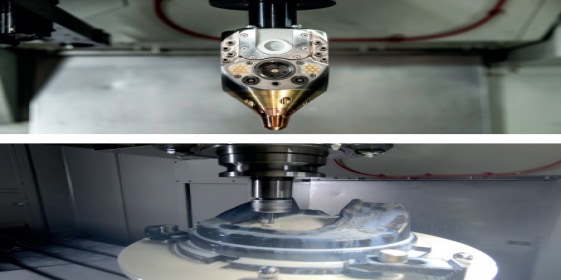Additive manufacturing and machining engineers at the National Manufacturing Institute Scotland (NMIS), which is run by the University of Strathclyde, have developed a low-cost remanufacturing solution (DigiTool Project) that can extend the life of parts used in manufacturing by 120 percent, assisting UK manufacturers to embrace the circular economy, boost sustainability, and save money. According to PWE.
DigiTool Project
The two-year £1.2 million DigiTool project was part-funded by Innovate UK and focused on the remanufacture of dies, which are extensively used in the hot forging, stamping, and pressing industries.
The new DigiTool framework, designed to provide a low-cost solution to these industry difficulties, allows manufacturers to embrace remanufacturing, which is when previously worn or damaged items, in this instance dies, may be restored to “like-new” state.
The framework comprises a three-stage remanufacturing process that uses a hybrid platform that mixes additive manufacturing and machining and may be adapted to a conventional machine tool to reduce entry costs.
Using this method, worn portions are detected using a mix of scanning and metrology, and then additive manufacturing techniques are employed to finish the remanufacture back to the intended die shape.
The DigiTool team has successfully utilized the framework to assist an industrial partner in extending the life of a die by 120 percent, allowing it to produce more than twice its regular output of complicated components for the forestry sector before investing in a new one.
The new DigiTool framework, which may offer considerable manufacturing cost reductions that can be passed on to end users, will allow manufacturers to remanufacture on site without having to move materials, reducing environmental impact while also saving costs, time, and resources.
Toolroom Technology Limited (TTL), Applied Tech Systems (ATS), Hybrid Manufacturing Technologies (HMT), INSPHERE Ltd, and Kimber Mills International are among the project partners.
“DigiTool is one of the most substantial investments of its sort inside the tool and die sector for over 40 years,” said Stephen Fitzpatrick, machining and additive manufacturing team head at the National Manufacturing Institute Scotland. This project has been really collaborative, and we have combined knowledge from a variety of backgrounds to deliver a response to a difficulty that the tool and die industry has been battling for decades.
“The firms involved were eager to innovate, decrease costs, and implement circular economy techniques, but with limited investment, it was difficult to find a solution for the high costs associated with replacing worn parts that were not performing to their full capacity.”
“The DigiTool framework now allows businesses to modify current gear at a cheap cost to incorporate laser metal deposition additive manufacturing and remanufacture on site, prolonging die lifespan, improving production productivity, and enhancing their competitive edge.”
Toolroom Technology Limited (TTL) oversaw the project, with NMIS specializing in additive manufacturing. The other project partners contributed research in their own areas of expertise, such as metrology and scanning, adaptive machining, and digital integration. NMIS is looking into ways to fully automate the technology and modify it for high-value components.
Subscribe to AM Chronicle Newsletter to stay connected: https://bit.ly/3fBZ1mP
Follow us on LinkedIn: https://bit.ly/3IjhrFq
Visit for more interesting content on additive manufacturing: https://amchronicle.com/


